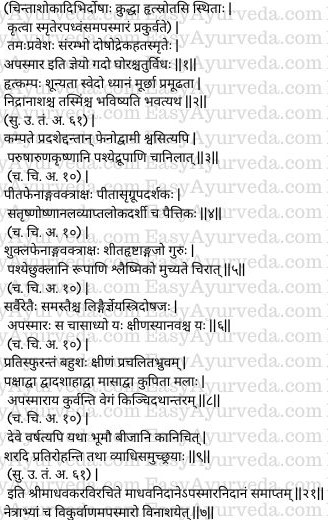Madhava Nidana Chapter 21 Apasmara Nidanam
This article explains Madhava nidana 21st chapter “Apasmara Nidanam”. Causes, pathology and symptoms of Apasmara are explained in this chapter.
Read – Acharya Madhavakara: His Work ‘Madhava Nidana’, Legacy, Amazing Facts

Table of Contents
Apasmara Samprapti, Swarupa
Pathogenesis and nature of epilepsy
(The doshas having become increased (aggravated) by worry, grief, etc. get lodged in the channels of the hrdaya (mind, brain), make for loss of memory (knowledge, consciousness) and produce the disease apasmāra).
In Apasmāra the person experiences a feeling as if entering into a zone of utter darkness (the person experiences darkness in front of his eyes and he experiences entering into a zone of ignorance which is in the form of darkness, loss of consciousness), and does many types of activities including violent movements of the eyes, limbs (convulsions) etc.
All these happen due to the destruction (loss) of memory caused by severely aggravated doshas. This dreaded disease is called Apasmara and is of four kinds. (1)
The four types of apasmara are – vataja, pittaja, kaphaja and tridoshaja.
Read – Apasmara Meaning And Understanding
Apasmara Purvarupa
Premonitory symptoms of apasmara
The premonitory symptoms of apasmara are – palpitation of the heart, feeling of emptiness (of the mind), perspiration, worry, fainting, destruction of activities of mind and senses (delusion), and loss of sleep. (2)
Read – Epilepsy – Ayurvedic Understanding And Its Treatment
Symptoms of Vataja Apasmara
The symptoms of vataja apasmara are – tremors (convulsions), grinding of teeth, frothy vomiting, dyspnoea (increased respiration), and roughness of the body. All things around him appear to be of reddish black colour before the attack (before he falls and goes into unconsciousness). (3)
Symptoms of Pittaja Apasmara
The symptoms of pittaja apasmara are – yellow coloured froth around the mouth, yellowish skin, face and eyes. He sees all things around him being yellow or red coloured (before the attack, before going into unconsciousness). He also will have severe thirst, feeling of excessive heat in the body and would see the surroundings as if covered (burning) with fire (that everything around him is being burnt by the fire). (4)
Read – Charaka Apasmara Nidana: 8th chapter
Symptoms of Kaphaja Apasmara
The symptoms of kaphaja apasmara are – whitish froth at the mouth, white colour of the skin, face and eyes, (feeling of) coldness and heaviness of the body, horripilation, and seeing white coloured things (he sees all things around him being white in colour, before the attack). The attacks of this type of apasmara ends very late i.e. the person regains consciousness long time after the attack. (5)
Tridoshaja Apasmara
Symptoms of Tridoshaja / Sannipataja Apasmara and symptoms of incurability of apasmara
In tridoshaja / sannipataja apasmara is caused by the aggravation of all the three doshas and the symptoms of all three doshas are seen in this condition.
This type of apasmara (tridoshaja), the apasmara manifested in persons who are emaciated and apasmara which is not of recent onset (chronic apasmara) – are all said to be incurable. (6)
Other symptoms of incurability of apasmara
When apasmara occurs with too much of (severe and continuous) tremors (convulsions), emaciation, fierce movement of eyebrows (eyebrows deviated in upward direction) and eyes (deformities in the eyes), it would kill the person (it becomes incurable). (7)
Read – Charaka – Apasmara Chikitsa – 10th chapter

Period of aggravation of apasmara
The doshas get aggravated (regularly) on 5, 12 or 30-days intervals and produce episodes of apasmāra (epileptic seizures). Sometimes the episodes (attacks) can take place at any other interval of time, even apart from these intervals (whenever there is aggravation of accumulated and latent doshas). Just as the seeds which lay in the earth even during rainy season sprout only during sarat ritu (autumn season) i.e., when the favourable season for their sprouting appears, the diseases also, (in spite of being latent in the body) develop only after a certain period of time. (8-9)
Thus ends the chapter on Apasmara Nidanam in Madhava Nidana text written by Acharya Madhavakara.









